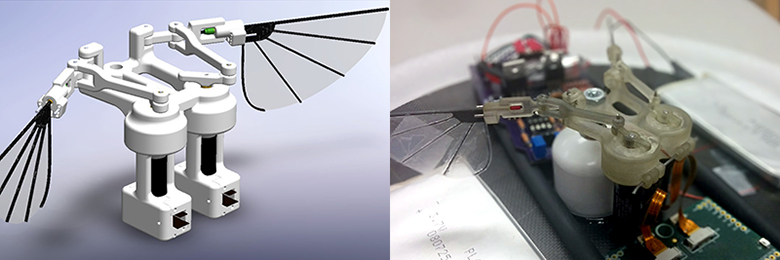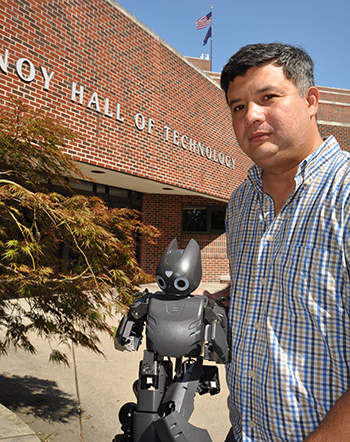
Mauricio Gomez looks forward to the day when more robots can be found in our homes and our work spaces. In fact, his PhD research within the Purdue Polytechnic is aimed at that goal.
“I’m looking to use robots to make human life more comfortable,” Gomez says. To do that, his research projects have focused on programming robots to survive and adapt, even when the programmer can’t anticipate every scenario a robot may encounter.
Gomez has been working on what he calls the “flapping wing project” as part of the college’s M2M Lab. In a research project sponsored by the Air Force Research Laboratory, his role is to model check the flapping wing robot developed by researchers at Wright State University. Model checking consists of verifying the specifications of a device.
 “It becomes a problem in robots, because the programmer has to figure out, according to current status, what can happen in the future,” Gomez says. “My idea is that there are some specific variables that should be being verified all the time. In animals, when they notice that one of the variables is off, they try to make different things happen in order to survive. In the future, we should be able to figure out what a robot could do to keep working in any scenario.”
“It becomes a problem in robots, because the programmer has to figure out, according to current status, what can happen in the future,” Gomez says. “My idea is that there are some specific variables that should be being verified all the time. In animals, when they notice that one of the variables is off, they try to make different things happen in order to survive. In the future, we should be able to figure out what a robot could do to keep working in any scenario.”
This focus on robot survivability is only one aspect of Gomez’s research into making robots more adaptive. He also has worked on projects with the humanoid Darwin robot, programming it to emulate specific athletic moves, such as intercepting a soccer ball or putting a golf ball. While the tasks seem simple, they involve complex systems where the computer must make decisions and calculations based on sensor inputs.
A native of Guatemala, Gomez came to Purdue by way of his master’s program in Korea. Eric Matson, associate professor of computer and information technology at Purdue, was teaching a robotics class as a visiting professor at Gomez’s university (Name of University), and invited him to apply to Purdue’s PhD program. He will spend the 2016-17 academic year in France to continue his research on assistive robotics. Gomez anticipates graduating with his PhD in May 2017.
